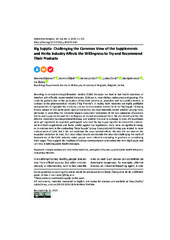Приказ основних података о документу
Big Suppla: Challenging the Common View of the Supplements and Herbs Industry Affects the Willingness to Try and Recommend Their Products
| dc.creator | Mijatović, Nevena | |
| dc.creator | Šljivić, Jasmina | |
| dc.creator | Tošić, Nemanja | |
| dc.creator | Conić, Ljubica | |
| dc.creator | Petrović, Marija | |
| dc.creator | Žeželj, Iris | |
| dc.date.accessioned | 2023-03-13T10:43:12Z | |
| dc.date.available | 2023-03-13T10:43:12Z | |
| dc.date.issued | 2022 | |
| dc.identifier.issn | 0039-3320 | |
| dc.identifier.uri | http://rifdt.instifdt.bg.ac.rs/123456789/2786 | |
| dc.description.abstract | Resorting to complementary/alternative medical (CAM) therapies can lead to bad health outcomes or interfere with officially recommended therapies. CAM use is, nevertheless, widespread and growing. This could be partially due to the perception of the CAM industry as powerless and non-profit oriented, in contrast to the pharmaceutical industry (“Big Pharma”). In reality, both industries are highly profitable and powerful; to highlight this similarity, science communicators coined the term “Big Suppla”. Drawing from a sample of 242 participants upon all exclusions, we experimentally tested whether varying these attributes in presenting the industries impacts consumers’ evaluation of the two categories of products (herbs and supplements) and their willingness to try and recommend them. We also tested whether the effect is moderated by conspiratorial thinking, and whether it is due to a change in trust. All hypotheses were pre-registered. As expected, participants who read the Big Suppla vignette decreased the endorsement of both supplements and herbs, whilst, against our hypotheses, there were no significant changes in endorsement in the contrasting “Baby Suppla” group. Conspiratorial thinking was related to more endorsement of CAM, but it did not moderate the experimental effects. We also did not observe the expected mediation by trust. Our most robust results corroborate the idea that challenging the myth of benevolence of the CAM industry makes people more critical in evaluating its products or considering their usage. They support the intuitions of science communicators who coined the term Big Suppla, and can help in tailoring public health messages. | sr |
| dc.language.iso | en | sr |
| dc.publisher | Bratislava: Institute of Experimental Psychology Centre of Social and Psychological Sciences Slovak Academy of Sciences | sr |
| dc.rights | openAccess | sr |
| dc.rights.uri | https://creativecommons.org/licenses/by/4.0/ | |
| dc.source | Studia Psychologica | sr |
| dc.subject | complementary and alternative medicine, perception of power, questionable health behaviors, conspiracy theories | sr |
| dc.subject | complementary and alternative medicine | sr |
| dc.subject | perception of power | sr |
| dc.subject | questionable health behaviors | sr |
| dc.subject | conspiracy theories | sr |
| dc.title | Big Suppla: Challenging the Common View of the Supplements and Herbs Industry Affects the Willingness to Try and Recommend Their Products | sr |
| dc.type | article | sr |
| dc.rights.license | BY | sr |
| dc.rights.holder | Copyright (c) 2022 Studia Psychologica | sr |
| dc.citation.issue | 1 | |
| dc.citation.volume | 64 | |
| dc.citation.spage | 91 | |
| dc.citation.epage | 103 | |
| dc.identifier.doi | 10.31577/sp.2022.01.841 | |
| dc.type.version | publishedVersion | sr |
| dc.identifier.fulltext | http://rifdt.instifdt.bg.ac.rs/bitstream/id/9649/Mijatovic_SP_1_vol.64_2022_pp.91-103-1.pdf |

